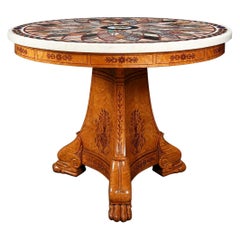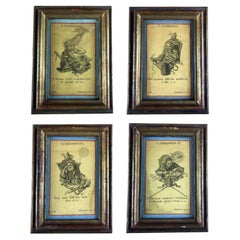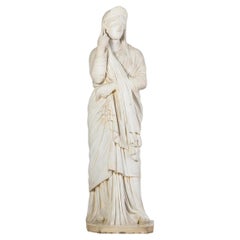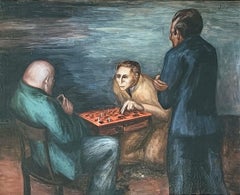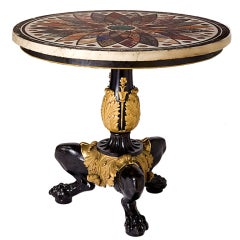Antique Furniture Augusta
1890s British Antique Furniture Augusta
Canvas, Giltwood
1870s English Other Antique Furniture Augusta
Paper
1830s English Georgian Antique Furniture Augusta
Paint
Early 20th Century American Art Nouveau Antique Furniture Augusta
Paint
1820s Russian Revival Antique Furniture Augusta
Wood, Paint
19th Century American Romantic Antique Furniture Augusta
Paint
1820s French Charles X Antique Furniture Augusta
Stone, Marble
Mid-19th Century Antique Furniture Augusta
Paper
1910s French Beaux Arts Antique Furniture Augusta
Paint
1920s Italian Antique Furniture Augusta
Bronze
Late 18th Century German Neoclassical Antique Furniture Augusta
Glass, Giltwood, Paper
19th Century Italian Antique Furniture Augusta
Statuary Marble
17th Century Italian Antique Furniture Augusta
Wood
Mid-19th Century British Romantic Antique Furniture Augusta
Canvas, Wood
1890s French Art Nouveau Antique Furniture Augusta
Bronze
Late 19th Century Swedish Romantic Antique Furniture Augusta
Canvas
Mid-19th Century English Folk Art Antique Furniture Augusta
Wool
Early 1900s North American Antique Furniture Augusta
Leather
1920s German Art Deco Antique Furniture Augusta
Porcelain
Early 18th Century Italian Baroque Antique Furniture Augusta
Glass
19th Century Italian Classical Roman Antique Furniture Augusta
Wool
1820s Italian Neoclassical Antique Furniture Augusta
Sterling Silver, Brass
Late 18th Century Antique Furniture Augusta
Paper
1910s French Art Nouveau Antique Furniture Augusta
Bronze
Early 20th Century English Neoclassical Antique Furniture Augusta
Stoneware
Early 20th Century Photorealist Antique Furniture Augusta
Oil, Photographic Paper, Silver Gelatin
People Also Browsed
18th Century Antique Furniture Augusta
Canvas, Oil
1930s American Realist Antique Furniture Augusta
Oil, Board
Late 18th Century French Louis XVI Antique Furniture Augusta
Glass, Crayon, Paper, Giltwood, Canvas
1970s Modern Antique Furniture Augusta
Oil, Board
18th Century English Antique Furniture Augusta
Canvas, Wood, Paint
1920s Impressionist Antique Furniture Augusta
Pastel
2010s French Modern Antique Furniture Augusta
Ceramic
1870s Belgian Belle Époque Antique Furniture Augusta
Gesso, Glass, Pine, Paint
20th Century Unknown Antique Furniture Augusta
Porcelain
Late 19th Century Belgian Romantic Antique Furniture Augusta
Canvas
Early 2000s American Impressionist Antique Furniture Augusta
Masonite, Oil
1790s English George III Antique Furniture Augusta
Pine, Giltwood
1850s English Classical Greek Antique Furniture Augusta
Paper
Late 18th Century English Antique Furniture Augusta
Wood, Giltwood
19th Century Antique Furniture Augusta
Wood Panel, Oil
18th Century European Late Victorian Antique Furniture Augusta
Canvas
Recent Sales
Mid-19th Century English Antique Furniture Augusta
Paper, Watercolor
19th Century English Antique Furniture Augusta
Marble, Iron
16th Century Renaissance Antique Furniture Augusta
Wood
19th Century French Antique Furniture Augusta
Marble
Early 20th Century French Belle Époque Antique Furniture Augusta
Carrara Marble
1850s Italian Antique Furniture Augusta
Bronze
1870s American Antique Furniture Augusta
Composition
1880s American Renaissance Revival Antique Furniture Augusta
Iron
Mid-17th Century American Antique Furniture Augusta
Mid-19th Century English Victorian Antique Furniture Augusta
Paper
1860s Italian Antique Furniture Augusta
Paper
18th Century Italian Antique Furniture Augusta
Canvas
19th Century French Antique Furniture Augusta
Early 18th Century English Antique Furniture Augusta
19th Century Italian Antique Furniture Augusta
Glass, Oak
19th Century American Adirondack Antique Furniture Augusta
Paint
Early 1900s English Arts and Crafts Antique Furniture Augusta
Walnut
1860s German Romantic Antique Furniture Augusta
Canvas
1830s English Antique Furniture Augusta
Wood
Early 19th Century English Antique Furniture Augusta
Early 20th Century English Neoclassical Antique Furniture Augusta
Bronze
19th Century American Art Nouveau Antique Furniture Augusta
Sterling Silver
1830s English Antique Furniture Augusta
Wood
Late 19th Century American Antique Furniture Augusta
Wool
Early 20th Century Israeli Art Deco Antique Furniture Augusta
Silver
Early 20th Century Impressionist Antique Furniture Augusta
Paper, Watercolor
Mid-18th Century Old Masters Antique Furniture Augusta
Oil
Early 1900s French Art Nouveau Antique Furniture Augusta
Stoneware
19th Century English Victorian Antique Furniture Augusta
Pine
19th Century Austrian Neoclassical Antique Furniture Augusta
Enamel, Silver
1870s English Victorian Antique Furniture Augusta
Majolica
1870s English Victorian Antique Furniture Augusta
Majolica
1870s English Victorian Antique Furniture Augusta
Majolica
Early 20th Century Impressionist Antique Furniture Augusta
Paper, Watercolor
Mid-19th Century Canadian Native American Antique Furniture Augusta
Beads, Silk, Wool
Early 20th Century American Antique Furniture Augusta
19th Century American Antique Furniture Augusta
19th Century American Folk Art Antique Furniture Augusta
Wood
Late 18th Century English George III Antique Furniture Augusta
Glass, Giltwood, Paper
Early 20th Century Antique Furniture Augusta
Canvas
19th Century Antique Furniture Augusta
19th Century American Antique Furniture Augusta
Mid-18th Century English Antique Furniture Augusta
Early 20th Century French Art Nouveau Antique Furniture Augusta
Fabric, Ceramic
Antique Furniture Augusta For Sale on 1stDibs
How Much is a Antique Furniture Augusta?
- What makes furniture an antique?1 Answer1stDibs ExpertAugust 15, 2019
A piece of furniture is considered an antique if it is at least 100 years old.
- Is antique furniture in style?1 Answer1stDibs ExpertApril 22, 2024Yes, antique furniture is in style. Many people appreciate the beauty and handcrafted character of antique furniture and love the idea of owning pieces with a rich history. Remember that style preferences are nothing if not fluid, meaning what's in one year may not be the next. So, in choosing the furniture you're planning to live with, you should pay less attention to interior design fads than to what speaks to you. That way, you can select pieces that will add long-term character to your home. On 1stDibs, find a large collection of antique furniture.
- 1stDibs ExpertApril 5, 2024To know if your furniture is antique, look for labels and markings that indicate the maker. From there, you can use trusted online resources to determine when they were active and examine images to try to estimate the age of your piece. Furniture produced 100 years ago or more is antique. You can also have your furniture assessed by an appraiser or antiques dealer to learn about its age. On 1stDibs, explore a large collection of antique furniture.
- 1stDibs ExpertFebruary 22, 2021Antique furniture can be worth quite a lot, particularly if it is in good quality. The rarer the piece, the higher the value.
- 1stDibs ExpertFebruary 22, 2021There are a number of factors that can indicate if your antique furniture is valuable. When determining the value of antique furniture, consider its rarity. Additionally, it is important to determine the quality and condition of vintage furniture. If unsure of the value of your vintage furniture, have it appraised.
- 1stDibs ExpertFebruary 1, 2024To date antique furniture from the UK, first look for identifying markings on the piece. You can then use trusted online resources to determine when the maker was active. From there, you may be able to estimate the year of production by looking at images of other furniture the maker produced. An expert appraiser or antiques dealer can also aid you in the dating process. Find a large selection of antique furniture on 1stDibs.
- 1stDibs ExpertFebruary 13, 2024Whether antique furniture is making a comeback is a matter of opinion. Many people would argue that antique furniture never faded from fashion, as there have always been individuals who love the idea of owning pieces that have history. Some of the most popular styles for antique furniture include Art Deco, Arts and Crafts, Renaissance Revival, Elizabethan, Gothic Revival, Victorian and Chippendale. Find a large collection of antique furniture from some of the world's top dealers on 1stDibs.
- 1stDibs ExpertOctober 5, 2021The best finish for antique furniture is a matter of liking. But film finish is recommended by experts as it leaves a thick coat of film on the wood surface which protects wood from water and scratches. Shellac or varnish and water base are commonly used film finishes. Find an exquisite collection of antique, new and vintage furniture on 1stDibs
 PAGODA REDOctober 7, 2020
PAGODA REDOctober 7, 2020To determine the age of a Chinese furniture piece, look carefully at the joinery and finish. Natural expansion and contraction of the wood over time will cause a joint to protrude or retract, distorting a once-seamless fit. Antique lacquer finishes become crackled and worn over time. Areas of exposed wood, such as the underside of a table, the footrest of a chair, or the back of a cabinet should appear raw and dry compared to the finished surface. With use, the legs of tables and chairs become weathered near the bottom from precipitation and use.
- 1stDibs ExpertJanuary 25, 2019
The difference between vintage and antique furniture is that vintage furniture is at least 20 years old, while antiques must be at least 100 years old to be considered antique.





